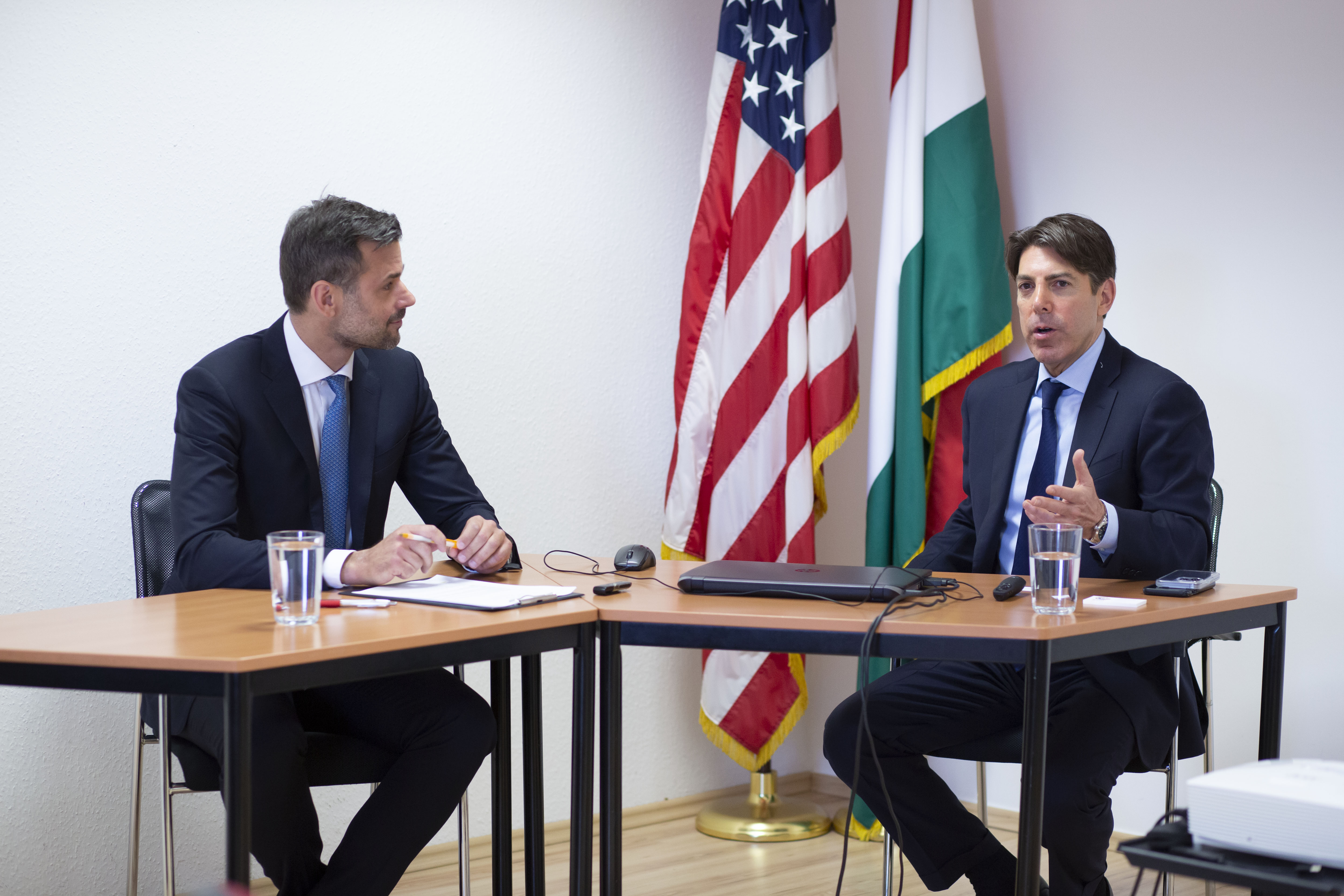Biden, Trump, Presidential Elections and Hungary’s Reputation

Event moderator Dávid Kőhegyi (left) and White House Correspondent Jon Decker.
Photo by Hajnalka Hurta / AmCham Hungary
“The two questions I get most often are: Will Joe Biden run again? Will Donald Trump run again?” Jon Decker, White House Correspondent for Gray Television, told a small but enthralled AmCham Hungary audience on April 21.
“No one knows the answers to those questions with any certainty, except those two individuals,” Decker freely admitted. However, noting that incumbent Biden has already said that, health permitting, he will run again, Decker said: “I take him at his word. I think of all the Democrats that are out there, he’s probably the strongest that could run.”
Should the incumbent retire, however, Decker, a reporter on White House politics since 1995, was dismissive of Vice President Kamala Harris’ chances. “I think the feeling is that she’s not as strong a candidate as Democrats would like. I don’t think she’s a terrific campaigner: remember, she dropped out when she ran for president even before the Iowa caucus.”
Rather, Decker pointed to a relative outsider as his tip for the Democratic nominee, Gavin Newsom, Governor of California.
“Compared with a lot of candidates that we’ve seen recently run for president, like Donald Trump and Joe Biden, he’s a lot younger, he’s really sharp, he’s bright, he’s a good politician, and he comes from the largest state in the country. He can raise money,” he argued. “He’s one of those candidates who can unite all those various elements that make up the Democratic Party.”
The legally trained Decker proffered a more nuanced, controversial assessment regarding Trump.
“That’s the elephant in the room. Most people in Washington, when asked that question, say, ‘Yeah, he’s running right now! He’s been running since the day he lost,’” the correspondent said.
And with good reason. Trump has organized numerous campaign rallies and raised USD 100 million to support a potential bid. Pretty compelling evidence of his determination, many say. Yet Decker is far from convinced.
Devastating Defeat
“I don’t think he’s going to run,” he said. “The first time I interviewed Donald Trump was in 1999. I’ve known him for many years; he was a private citizen back then, not a politician. [...] The loss that he suffered in 2020, although he would never admit this, but it was devastating for him, it really was,” Decker said
After watching Trump for more than two decades, Decker believes the former President “sees everything in black and white; there are no grays. You are either a winner or a loser, and losing that election was not good for his ego; it wasn’t good in terms of the way he wants to be seen by not only the American public but the public at large in the world.”
In short, Decker reckons, the risk of such emotional pain from a second defeat at the polls would make Trump pull back.
“I don’t think he wants to risk being a two-time loser. That would be devastating for him, his obituary as a two-time loser for president,” he reasoned.
Instead, the former real estate tycoon will become kingmaker, deciding on the Republican nominee for the presidential elections in 2024 most suited to take up the “America First” agenda. Who, moderator Dávid Kőhegyi asked, might that person be?
Decker was careful to spread his bets. Names included the Governor of Florida, Ron DeSantis, Mike Pompeo, the former Secretary of State, and senators Ted Cruz (Texas), Josh Hawley (Missouri) and Marco Rubio (Florida).
But, he said, former Vice President Mike Pence had covered a lot of ground “making the connections necessary” for a future presidential bid across a broad spectrum of Republican supporters. Pence, Decker said, “has a better shot than most.”
Hungary Breaking Ranks? It’s a Shrug of the Shoulders in Washington
John Decker was largely dismissive regarding any serious concerns in Western capitals or U.S. investors’ minds caused by Hungary’s unwillingness to aid Ukraine in its conflict with Russia.
According to the White House correspondent: “From my perspectives in the U.S., in Washington, I think it’s dealt with with a shoulder shrug. That’s Hungary, that’s Orbán,” he said.
Moreover, he reasoned that Hungary’s isolation among its Western allies in response to the war would not cause investors any lost sleep.
“I don’t think that it impacts U.S. investment at all in terms of what has happened in Hungary before and what will happen now that the election has taken place. I don’t think that will impact things at all.”
For Decker, since the European Union is a grouping of 27 sovereign states, disagreements are simply par for the course.
Family Disagreements
“Like any family, you will have disagreements, and those disagreements are sometimes out in the open. […] You will always be able to find critics in the EU who can say unkind things about Hungary. That will not go away,” he said.
Hungary and Germany oppose tough energy sanctions “for good reason,” he argued, since both economies depend on Russian energy. As for Hungary refusing to allow the transfer of arms through Hungarian territory to help Kyiv, that too is a minor irritant.
“We can still get that equipment to where it needs to go easily through our other NATO and EU allies,” he reasoned. Nonetheless, Budapest’s reluctance to assist Ukraine inevitably raises questions.
“Should Hungary even be a member of the EU and NATO? You’re going to find those critics, but for the most part, there is value that they see in having Hungary as a member of both entities,” he said, reminding his audience that Turkey, which has annoyed the United States in recent years over controversial arms purchases, remains an important NATO member.
“The big picture is the value that they [Turkey and Hungary] bring in being a member, and I think that far outweighs these other disagreements [among the allies] that you are seeing right now,” he concluded.
Decker on U.S.-Hungary Relations and Ukraine
“When Jen Psaki, the White House Press Secretary, is asked about Hungary, she only has nice things to say. She has not said an unkind word about Mr. Orbán. I don’t know what she says in private, but that’s public, and the reason is that it’s important to show a unified front, to show that between the EU and U.S., there’s no daylight separating us.”
This article was first published in the Budapest Business Journal print issue of May 6, 2022.
SUPPORT THE BUDAPEST BUSINESS JOURNAL
Producing journalism that is worthy of the name is a costly business. For 27 years, the publishers, editors and reporters of the Budapest Business Journal have striven to bring you business news that works, information that you can trust, that is factual, accurate and presented without fear or favor.
Newspaper organizations across the globe have struggled to find a business model that allows them to continue to excel, without compromising their ability to perform. Most recently, some have experimented with the idea of involving their most important stakeholders, their readers.
We would like to offer that same opportunity to our readers. We would like to invite you to help us deliver the quality business journalism you require. Hit our Support the BBJ button and you can choose the how much and how often you send us your contributions.









